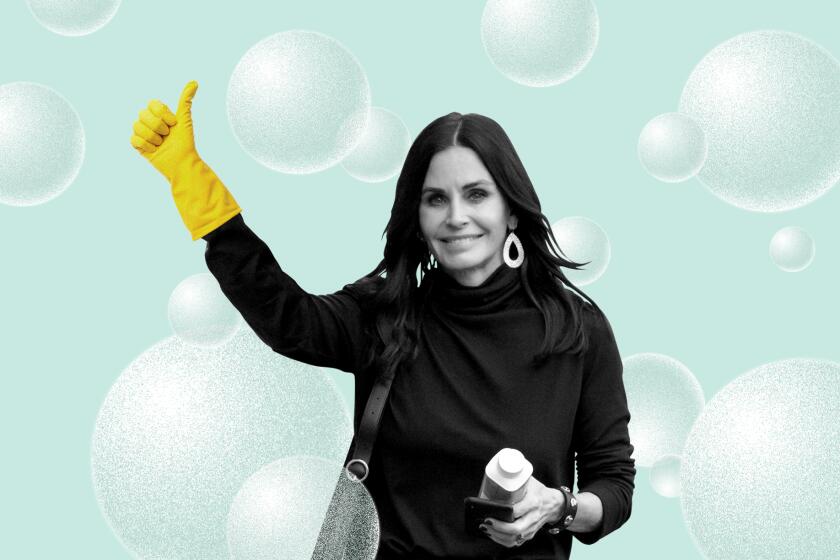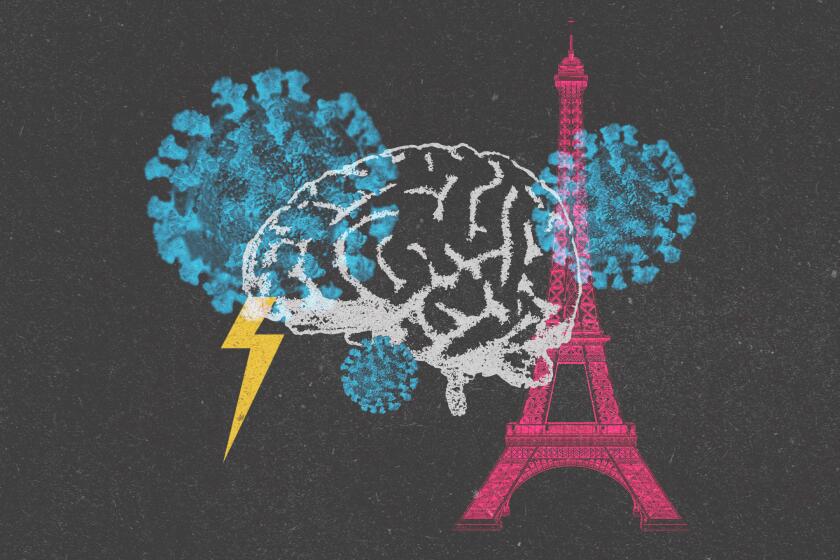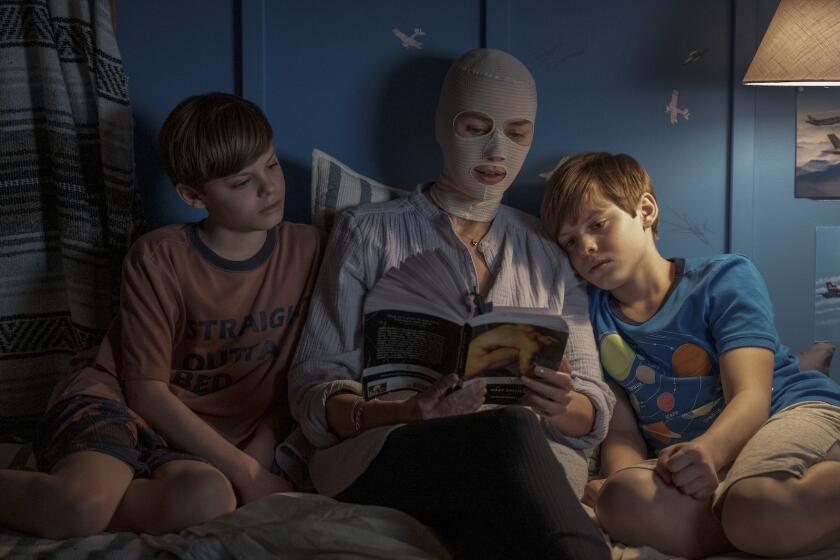Column: I’m glad Courteney Cox is talking about menopause. Now can we do something about it?

Naomi Watts says it will empower you; Courteney Cox warns that it will consume you; one recent study argues it may be a reason women are leaving the workplace; and a British company is using NASA technology to help.
I’m talking about menopause, and so are women in increasing numbers and in wildly varied ways.
Cox, 58, recently posted an Instagram update to her 1985 Tampax commercial (with its alarming emphasis on feeling “clean”) that lists the many symptoms of menopause and ends, “Remember — there is nothing good about menopause. It can actually change the way you feel about getting older.”
Watts, on the other hand, is posting celebrations of the seismic hormonal event. At 53, she is leaning into the menopause-equals-freedom manifesto encapsulated by Kristin Scott Thomas’ magnificent monologue in Season 2 of “Fleabag.”
She is also, not coincidentally, launching Stripes, a new menopause beauty brand.
Gwyneth Paltrow, who turns 50 today, staked her menopausal claim years ago with Madame Ovary, a “supplemental protocol” designed to relieve peri- and menopausal symptoms.
In the U.K., Fifty One Apparel has begun making hot-flash-friendly clothes, using the technology NASA developed to help astronauts stay comfortable in their space suits.
I begrudge no woman her own beauty or supplemental protocol line; nothing sparks a conversation more quickly in our culture than a bunch of cleverly packaged stuff. But can we stop depending on a few random celebrities (and Michelle Obama) to “bravely” come forward about their personal experience of menopause and start treating it like the public health issue that it is?
Courteney Cox has created a whole new luxury market: scented cleaning products. In this age of celebrity NFTs, it seems refreshingly down-to-earth.
According to a recent study, about 27 million members of the American workforce are peri- or fully menopausal. According to a 2022 survey, at least 20% of them have at least considered leaving the workplace due to a lack of support. Many of those women are, by definition, senior staff members, risking a potential brain drain.
In the U.K., similarly alarming statistics have led to national action. In 2019, Channel 4 announced it would offer flexible work schedules and paid leave for those suffering menopausal symptoms. In 2021, an independent report commissioned by the Minister for Employment offered a list of recommendations for employers, including reviewing sick leave policy and offering flex time. The NHS recently signed a pledge to educate and support workers experiencing menopause, and 600 companies, including the BBC, Tesco, Royal Mail and the London Zoo, signed a similar pledge. Some companies have begun creating quiet spaces for those suffering menopausal symptoms and training certain employees to become Menopause Champions to facilitate counseling and any necessary adjustments in schedule or workloads.
Obviously there is no “cure” for the decrease of estrogen that marks the end of fertility for more than half the population. But we could follow Britain’s lead by becoming more diligent about educating the public, accommodating them in the workplace and generally breaking the silence about an inevitable physical transition.
And the U.S. could certainly put a few more dollars into research on treatments for some of the myriad symptoms so billions of us don’t feel like we have to cope completely on our own.
As Wanda Sykes (the first woman I have ever seen admit to experiencing a hot flash while on camera) has been saying for years, there are innumerable treatments for erectile dysfunction, but menopausal women are often handed a fan and a prescription for Xanax and told to wait it out.
Here I feel compelled to add that menopause can last from seven to 14 years.
Compelled because no one informed me of that fact as I rounded the horn into my 50s.
Nor did anyone bother to tell me that “hot flash” is a laughably benign term for the wave of nuclear-meltdown heat that moves through your entire body until it lights up your head, or that the only thing you can think about for however long it lasts (10 minutes? 20? An entire freaking day?) is how hot — and then sweaty — you are.
We’ve all got COVID again, and the fog feels cumulative; in a summer when even vacation offers no respite, some form of convalescence feels necessary.
That’s just one of a startlingly long list of symptoms, including (but not limited to): migraines, insomnia, vaginal dryness, night sweats, brain fog, chills, mood swings, constipation, weight gain and heart palpitations.
I cannot be the only woman who, alarmed by the suddenly erratic beating in her chest, wound up hooked up to a heart monitor for two days only to learn (from my gynecologist rather than the cardiologist) that this was a “perfectly normal” symptom of menopause.
OK, cool. Cool, cool, cool. But it might have been nice to know beforehand. We all may know about those hot flashes — Lord knows male comedians have been making jokes about them long enough — but no one mentioned your heart pounding out of your chest, or the migraines, or the sudden inability to sleep more than an hour at a time.
Oh, and for at least a couple of years, you will still be getting your period with all the usual bloating, cramping and the rest. The best of both worlds!
Not everyone experiences all, or any, of these symptoms; as with menstruation or pregnancy, the degree of individual discomfort or disability is a crap shoot. Still, when talking about “mood swings” as if they are solely hormonal, please remember that you may also be dealing with someone who is regularly on fire, having a simulated heart attack and possibly a migraine while living on about two hours sleep and still getting menstrual cramps.
Honestly, it’s a wonder that women over 50 don’t commit more violent crimes. It explains why so many older women develop that fabulous “no effs given” attitude that sends them barging into the front of any line they see.
Especially when you consider how cavalier society has been about the whole damn thing. I won’t go as far as “massive cover-up.” But until fairly recently, the symptoms of this physical experience have been cloaked in banal terms, uttered sotto voce if at all. “She’s just going through ‘the change,’” men of my parents’ generation would say in hushed tones as their wives staggered toward the kitchen for the blessed relief of sticking their heads in the freezer or belligerently refused to “whip up something” for the five co-workers unexpectedly invited to dinner.
Plus, a Neil LaBute vampire movie, ‘House of Darkness,’ Camila Mendes and Maya Hawke ‘Do Revenge’ on Netflix, and Jon Hamm is the new ‘Fletch.’
Like menstruation, menopause has been mostly invisible in the still male-dominated realms of art and culture, except when played for a laugh or as yet another example of why women are such mystifying, mercurial creatures — and therefore men cannot be expected to understand them.
Meanwhile, the male midlife crisis, which includes virtually no physical symptoms, has dominated myth, legend, literature, film and television for centuries.
Women have often been complicit in the silence around menopause; it is, first and foremost, a function of aging, and we all know how women have been taught to feel about aging. Fertility, real or perceived, is still attached to sexuality and attractiveness, and in much of our cultural narrative, menopausal women are seen as being “done” with both.
This is absurd when you consider all the glorious and vital post-menopausal women who surround us. It’s why spokespeople like Watts, Sykes, Scott Thomas and Obama continue to be important.
And we are seeing menopause portrayed a tiny bit more frequently in film and television. In “Julia,” the HBO bio-series, Julia Child goes to the doctor to see why she has been experiencing night sweats only to be told she is entering menopause. At first she feels foolish for not figuring this out herself (as if women weren’t — aren’t — systematically kept in the dark about their own bodies); then she feels very sad.
Regretfully childless, Julia sees menopause as the end of something. She wonders if her husband will still find her attractive. Then she decides it is a sign that she should begin a new chapter — which, for Julia Child, means inventing the televised cooking show. We don’t witness any more symptoms throughout the series, but the point is well made.
Most of us will not use our menopausal and post-menopausal years to make cooking sexy and invigorate public television in the process, but maybe, if we all start being a bit more vocal and honest about what “the change” actually feels like, we too could help change the world.
Or at least get NASA to see what they can do about the insomnia.
Meredith Blake and Mary McNamara discuss why it was worth it to get up very early and stay up very late to watch Queen Elizabeth II’s funeral.
More to Read
The biggest entertainment stories
Get our big stories about Hollywood, film, television, music, arts, culture and more right in your inbox as soon as they publish.
You may occasionally receive promotional content from the Los Angeles Times.















